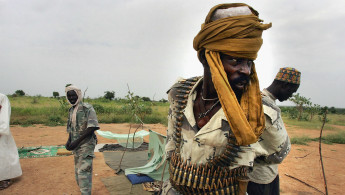Sudan's restive Darfur region 'faces rising threat of extremism'
Sudan is facing growing threats from armed groups as neighbouring countries are torn apart by civil war and violence, a UN panel and analysts have warned.
The deterioration in Libya during four years of civil war has made Sudan's vast, uncontrollable western border look ever more vulnerable as militant groups set up weapons smuggling routes and capitalise on instability in Sudan's war-torn Darfur region.
The UN panel of experts on Sudan has warned that Darfur is "potentially fertile ground" for infiltration by militants "owing to its porous borders and the cross-border family solidarity between Sudanese tribes and their African 'cousins' of Arab descent in Central African Republic, Libya, Mali and Niger".
Sudan also has a number of active militant groups, such as Ansar al-Sunnah, while others call for the establishment of the caliphate, such as Hizb al-Tahrir, in addition to the Islamic Constitution Front - whose members publicly support the Islamic State group (IS, formerly known as Isis).
Darfur has been in a state of civil war and tribal conflict for the past 12 years, with millions dead and displaced.
Unofficial statistics estimate that there are two million weapons in the region, despite attempts at disarmament.
| Egypt launches attacks against Islamic State group in Libya after 21 Copts murdered |
The former secretary-general of the Sudanese national security advisory, Hasballah Omar, told al-Araby al-Jadeed that the region was "ideal" for radical groups.
"The danger is not only from these groups expanding in Libya and Sudan, but there is a fear that they might expand into central African countries that have oppressed Muslim minorities, which constitute a fertile environment for the growth of such movements," he said.
"Khartoum is not yet a fertile ground for those groups, and they do not yet operate within the country - given they do not oppose the Sudanese government. However, that will change if Sudan takes part in the international efforts to fight them."
Groups being forced from other areas could easily cross into Sudan due to its poor border security.
'Extremist sympathies'
Some observers believe that extremist ideology exists in Sudan, as demonstrated by prayers held for Osama bin Laden after his death. The Sudanese regime hosted bin Laden and other al-Qaeda leaders in the 1980s before he moved to Afghanistan to fight the Soviet Union.
Sudanese youths have also travelled to fight in Afghanistan, Somalia and more recently alongside the IS group, although in relatively small numbers.
| The largest threat comes from Boko Haram, which is getting closer to western Chad. - Maher Abul Joukh, political analyst |
Maher Abul Joukh, a journalist and political analyst with years of experience and study in Sudan, said that some extremists had, however, started to view the Sudanese government as an ally of the US.
"Extremist groups have started viewing the Sudanese government in the same light as other regimes; as an agent working with Washington," he said.
Aboul Joukh said he did not believe that the Islamic State group posed a significant threat to Sudan, however - Boko Haram, the group which has waged a years-long war in northern Nigeria, was gaining influence in the region.
"The largest threat comes from the Boko Haram group, which is getting closer to western Chad," from its base in Nigeria, he said.
"The danger lays in the possibility of Boko Haram expanding into the central African countries that already suffer from a lack of government presence.
"Thus, the group would then be adjacent to Darfur and South Sudan," he said, adding that it meant that war in Darfur had the potential to become another led by violent jihad.
This is an edited translation from our Arabic edition.



